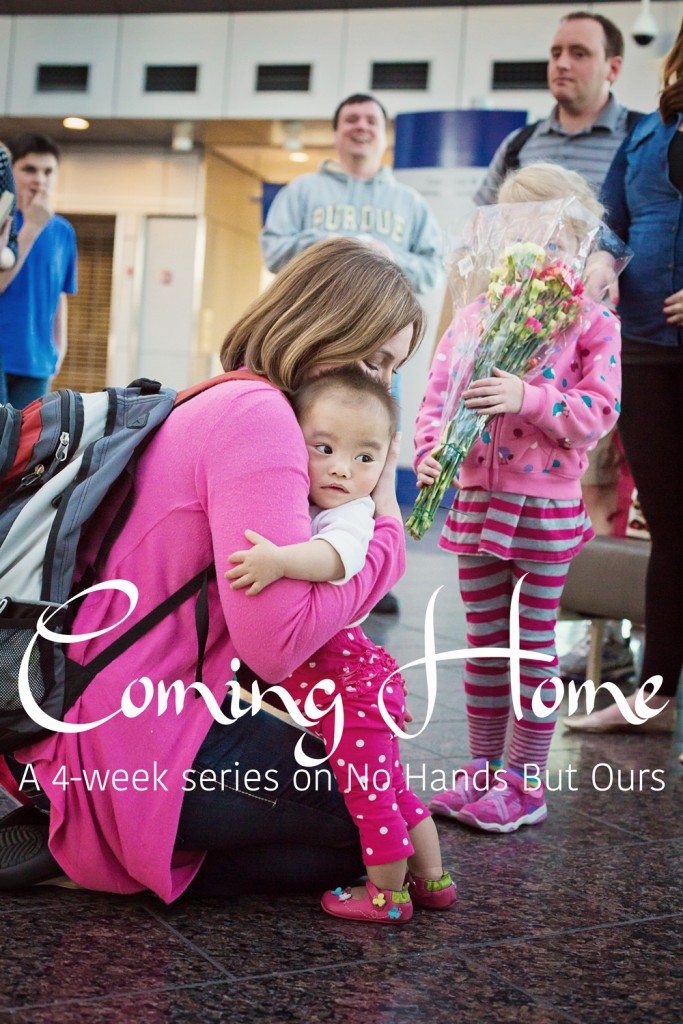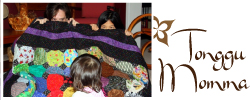I used to blog several years ago, but I dropped off the face of the earth when my oldest asked me to cease and desist. Since I want her to still love me when she’s thirty, and since my husband and I don’t want to have to pay for extensive therapy when she’s in her teens, we decided to let Our Little Tongginator collect cobwebs and dust bunnies. But Stefanie asked me to come out of the woodwork to share with y’all some of my advice on one’s first few months home after an international adoption. We chatted, my oldest and me, and she decided that would be okay.
A little bit of background: my husband and I adopted our oldest through China’s non-special needs program during the winter of 2005. She turned one with us in China. It took quite a while to settle into a new normal with her. We held on through sheer grit and determination (hers and ours) and a whole lotta faith. Because, I’ll be honest, the husband and I were in no way prepared for parenting a traumatized child. It was truly a comedy of errors on my part, but I’m stubborn, y’all, and my oldest is forgiving, so we managed to hang on and weather the storm of attachment challenges and sensory processing disorder. She is now an amazingly wonderful middle schooler who bakes up a storm (teachers request her treats!), writes entertaining short stories, loves to ride horses and plays the clarinet. She’s also a total fashionista (nature, not nurture, y’all). And most importantly, we strongly believe she is the most awesome eleven-year-old and the very best big sister in the world.
She adores her mei mei.

It took five years, but in the summer of 2011 we again adopted through China’s non-special needs program. Squirt turned one the day we flew home from China. We knew that something wasn’t quite medically right while we were still in country, but she was our daughter, and we knew we’d figure it out. We didn’t realize it would take ten months – over 300 days filled with stress, multiple medical tests, and a few scary moments – before we’d learn her diagnosis. Thankfully hers is a relatively simple fix: our child cannot be around gluten (wheat, barley, rye). Like, not at all. If she is exposed, she typically reacts with moderate to severe infections (including sepsis), seizures, tremendous brain fog and a whole host of other symptoms that aren’t very pleasant to deal with or read about. She is now an amazingly healthy, gluten-free five-year-old who just started kindergarten. She loves science and reading and all things fairy.
Since I’ve been doing this adoption parenting thing for a little over ten years now, Stefanie asked me to share a few tips and tricks with the benefit of a decade’s worth of perspective. I learned the vast majority of these lessons the hard way because oh! my! lands! did I make a ton of mistakes. I still don’t have it all together – because who does?!?! But here is what I personally wish I could have told my ten-years-ago self.
1. Strike a balance between attachment and medical and/or developmental stuff.
This, by far, is my biggest regret with my oldest. I pushed the developmental and sensory stuff too much, too soon, to the detriment of our attachment process. Of course I didn’t realize it at the time (or I wouldn’t have done it), but – looking back – I wish I had just taken a deep breath and given it more time. I wish I had focused on attachment above all else except for the physical well-being of my child. I’ve learned this past decade that everything else will likely come in time. That’s not to say that you shouldn’t contact your state’s early intervention program, but just… take a deep breath. If a developmental therapy hinders the attachment process, ease into it rather than plunging ahead. In terms of medical challenges, we need to take care of the big stuff, for sure, but what about the non-essential little things? It might be that those things can be addressed more slowly, over a sustained period of time. Talk to your doctor to see. I notice a huge difference with my oldest and youngest, and I believe it’s because I learned this lesson in time for the youngest to benefit.

2. Extended family and friend relationships might get messy, if not immediately, then years from now.
Adoptive parenting is different from parenting a biological child. Sometimes adoption adds just a few extra layers to things, but sometimes, especially when a child experienced a lot of trauma, the parenting can look vastly different. People who haven’t lived it just don’t understand how very difficult and different it can be. Often you can’t look to family members, friends or neighbors for sound advice that suits your child’s unique needs – and repeated rejections, even if silent and polite (“thanks for that advice – maybe we’ll try that” even when you won’t), can cause hurt feelings. Plus it’s very hard to deal with trauma, day in and day out, so you may not always be at your best. If your extended family and friends don’t understand the difficulties, more than likely they will judge you for your failures and out-of-the-norm decisions during this time. That may not be apparent right away, but their view of you as a parent will likely be shaped permanently by their observations from your first few years as an adoptive parent. Educate your family now, as best you can, and make purposeful decisions about extended family and friend interactions. If things don’t feel quite right, don’t brush those feelings aside. The “not-quite-right”ness will likely not disappear. Addressing it now through greater communication and/or more limited contact may make things easier in the long run, once you get through the major hurdles of attachment and developmental catch-up.
3. Work to build relationships with other adoptive families and families who share your child’s race.
This grows increasingly important as your child ages, but it becomes more and more difficult to do as they age. It’s much easier to make friends with other families when your children are in preschool together than it is when they attend the same (or different!) middle school(s). It just is. Make the effort now and it will pay off in the future. Adoptive family connections are very important, but equally important are connections with families who share your child’s race. I cannot stress this enough. If you are struggling to make these connections, consider personally participating in or enrolling your child in activities that will likely attract those you seek out, either due to topic or location. Relationships take time to grow – if you start now, they will be solid when your child needs them the most as a tween and teen.
4. Tell your child his or her adoption story often. Talk to your children about race regularly.
At first you should practice simply because it will likely feel uncomfortable. It takes time to find the words and phrases you want to use, and practice makes progress. (It’s never perfect. Because this is Tough Stuff.) But even when you grow more comfortable with these topics, you need to keep up the dialog. There are many, many reasons for this. First, adoptees understand these topics in different ways at different ages and stages. They may “know” certain facts, but they haven’t fully processed those facts. Several times the oldest has been “shocked” by a part of her story that we’ve always shared with her… she just didn’t fully grasp the implications until later. Children hear what they can handle, and their brains dump the rest, so keep up the dialog about adoption and race. Old information will become new information as their understanding increases. Secondly, the constant dialogue gives them permission to talk about it with you – if you wait for them to bring up the topics, some of them likely never will. Do not have them enter junior high and high school ill-equipped to deal with racial teasing and adoption questions. It begins early, sometimes even in preschool, so you have all of elementary school to help guide them. But that only works if you keep the conversation going. Ignoring it does not make it go away. And finally, as your children mature, they will likely develop their own opinions about adoption and race. Many adoptees have stated that they felt guilty or uncomfortable sharing their opinions when they knew or suspected that those opinions differ from that of their adoptive parents. Fostering an open dialog will show your child that you are open to hearing their thoughts and ideas about adoption and race. Ask open-ended questions. Listen to their responses. It will only help you grow closer.

5. Accept your child for exactly who he or she is.
I know it sounds insulting to even say this, but after ten years parenting my oldest, and four years parenting Squirt, I am just starting to fully grasp how extremely important this is for our children. Adult adoptees, again and again, talk about how they feel they don’t “fit” with their adoptive families. And there is a common thread of over-achieving and perfectionism among the adoptee community. This means that we, as adoptive parents, need to actively fight against the disconnect that creates these feelings. Pay close attention to their strengths and then foster them, even if those strengths aren’t familiar to you. Accept who they are at their core: if you’re a tomboy with a girly girl, embrace the ribbons and lace; and if you are parenting a tomboy, don’t force her to regularly wear dresses. Let them be who they are, and embrace their interests in ways that may seem over-the-top to others. And be sure to embrace mistakes and mishaps from an early age. Avoid placing academic pressure on your child. Encourage them to try things they’ll have fun doing, even if they’ll likely be terrible at, so that you can show them you love them just the same. And that being bad at something isn’t the end of the world.
So that’s it. That’s all I’ve got. I hope to have more in ten more years… because we’re always learning as parents, aren’t we?
– images courtesy of Krissi Trusty


























Love this post, Tonggu Mama.
I used to follow your blog since the beginning and then life happened I left the blog world. Nice to see you back and writing again. Also nice to hear about your girls again. Thanks for the great tips. We just came back with our 3rd daughter from China last month.
Hello, TM! Great article & so glad to hear from you again.